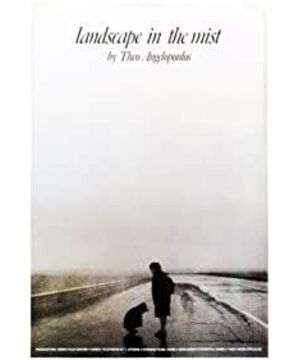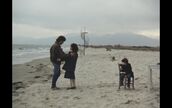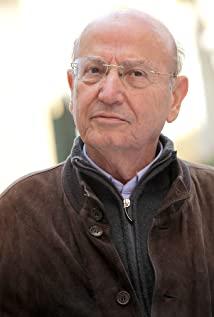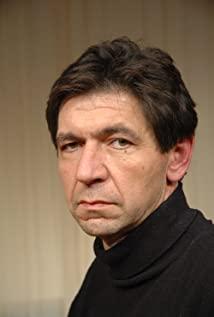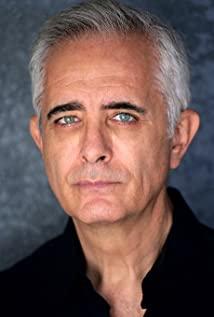Angelopoulos' "Ulysses and Agamemnon Complex"
The famous film critic Jonathan Romney once said: "To appreciate the real Greek drama, go to see Angelopoulos, whose films have turned ancient myths into modern masterpieces." It can be said that Angelopoulos went up and down in the film. Searching, endlessly exploring and cherishing those complex and tangled cultural memories and realistic scars, he said that the film is the presentation of a poetic world, the only thing it can do is to make the passage of time calm and sweet, it cannot Change the world, but it can adapt us - An Zhe has been shooting the same genre and even the same movie all his life, and the core of these movies, if we dig its roots, we can find the A shadow of a sun-drenched ancient Greek tragedy. Looking through Anzhe's 13 films, we can summarize the core of his films as "Ulysses Complex" and "Agamemnon Complex".
Angelopoulos is a film poet who explores life and soul. German poet Hölderlin said: "Is it necessary to write poetry in this vulgar age?" The end of the hot war, the end of the cold war, and the 20th century The end, the philosophical, poetic language seems to be coming to an end too. However, Anzhe recreates the ideals of poetry and philosophy that ancient Greece once had in the 4th century before the park in a stubborn way of classicism. As Nietzsche said in "The Birth of Tragedy": "The Greeks were thoughtful, they could feel the most delicate and the most severe pain. They looked directly at the so-called catastrophe and the cruelty of nature. Art saved them, and life through Art saves them and saves itself."
An Zhe left his hometown to join the army in Greece at the age of 18. At the age of 24, he wanted to settle in Paris, but finally chose to return to his hometown. In the 1970s, when he filmed his first feature film "Reappearance", it started his lifelong pursuit, thinking and reappearance about Greece and the ancient Greek spirit that sparkled two thousand years ago.
"Reappearance" resembles the story of Agamemnon in the ancient Greek tragedy, which also established the consistent storyline of all his works - traveling, searching, exploring and discovering in historical tragedy. The "Trilogy of Modern Greek History" - "The Years of 1936", "The Wandering Entertainer" and "The Hunter" - looks back at the 1940s and 1970s when Greece experienced fascist invasions, civil wars, and a right-wing military government. The above two complexes form the main line of the story and constitute the tragic core of his film. The "Silence Trilogy" - "A Journey to Sether Island", "The Beekeeper" and "Landscape in the Mist" - moves the stories of ancient Greece into the current context, focusing on the current spiritual wandering of the Greeks. The "Balkan Trilogy" - "Stork Hesitating", "The Gaze of Ulysses", "Eternity and a Day" - explores people, people, countries, history and reality from the perspective of the entire Balkan Peninsula. relationship, to explore the subtle waves of individuals in the history of the big era. It can be said that Angelopoulos persistently explored the relationship between time and space, grasping and retaining a classical spirit, culture and emotion that were gradually abandoned and forgotten by modern times in the tunnel of time and space. In the 20th century, literature, painting and other art forms were completely subverted, and human beliefs were also declared dead in a cry of Zarathustra. Anzhe seems to want to think through his films, when the baptism of time has passed, Are those things that can last forever in our memory? We were once hopeful, and we have never seen the world change like this in our history. So he extended his lens to history, to the famous ancient Greece that has survived and even melted into people's memory after two thousand years. Take a slow Ulysses and Agamemnon journey to find things, emotions and values that you can stay behind.
It can be said that "Greece" has become an important or core part of Angelopoulos' character, ideals and values. As he himself said: "The space for a person to probe deeply into his birthplace - as Greece is for me - is wider than any other place." Looking at his films, we will find that Anzhe Ulysses and Agamemnon are always referenced, and many films are about a man (mostly a husband or father) returning home.
Homer's epic "The Odyssey" tells the story of Ulysses, the king of Ithaca, returning home after a decade of wandering after the fall of Troy. On the way, Ulysses was teased by the gods, suffered everywhere, and finally returned home by the mercy of the gods. The party Ulysses lived in an exotic style. The nobles of Ithaca and neighboring countries bullied their weak wives and young children, proposed to his wife Penelope, forcing her to remarry, Penelope tried every means to delay, and finally especially Lysis returns home disguised as a beggar, kills the proposal with his son, and restores his power in Ithaca. In "The Gaze of Ulysses," Director A's quest for the three-reel negatives is like Ulysses returning to his hometown, and he has to go through many difficulties and obstacles to reach his destination. A in the final destination - Sarajevo in the smoke of gunfire - finds the first film negative of the long-lost Balkan region. This is not just a journey to find three lost rolls of negatives, but a journey of a creatively troubled director to find his first gaze, his own film, Ithaca. At the same time, his thirst for love is rekindled by this journey. Spiro, the old Communist who returned to China in "Journey to Sether Island", and the primary school teacher in "The Beekeeper" are also looking for their hometowns, but their return home can be seen as another exile, or even death. Ulysses is also projected in "The Stork Hesitating" and "Landscape in the Fog," but it is a foil in Homer's epic - Telemachus' search for his father. In Homer's epic, Telemachus is looking for his own father and also looking for his own identity. All men need a father, or fatherly blessing, to mature. Not only did Telemachus find his father, but he also helped him kill his seducer who was trying to take over his mother, and he became a real man. In "Stork Hesitating", the missing politician in the eyes of reporters is similar to the father figure of Ulysses. He let go of the shackles of being a film director and entered a private emotional world. In the end, the film director's heart was also baptized. . The film also quotes a verse from Dante's "The Divine Comedy": "Don't forget, it's time to travel again, and the wind will take your eyes far away." Destiny to set off. "Landscape in the Fog" tells the story of two brothers and sisters looking for a father they have never met. Like many young people, they have become a generation of "fatherless" and "rootless" who have lost their spiritual support in modern society. Alexander, the director of Journey to Seth, appears as "Ulysses"'s son, Telemachus, looking for a father figure in his filmmaking and getting involved in the end of the Greek civil war in 1949 After that, the hidden pain still remained. he
And Agamemnon is also the plot used by Angelopoulos. Although Agamemnon is also an important figure in Homer's epics, it is Aeschylus who really performs him on a large scale. Aeschylus's "Oresteia" trilogy -- "Agamemnon," "The Liberator," and "The Nemesis" -- is roughly as follows: Agamemnon's father and uncle were killed by the Golden Fleece This led to a power struggle, and in the end Agamemnon's father Atreus took the throne and killed his younger brother Theestes and his two sons. Thiestes' third son, Aegistos, held a grudge, killed Atreus, seized the throne and occupied Agamemnon's wife Clytemnestra. Agamemnon returned home ten years after his expedition to Troy, but was murdered by the conspiracy of the lovers, while Agamemnon's son Orestes avenged his father. It can be said that the tragedy of Agamemnon is not only a family tragedy, but also a tragedy brought about by war. Agamemnon fought bloody battles and besieged Troy for ten years. His soldiers were killed and wounded countless times. Finally, he won the final victory through the Trojan Horse. And behind the victory, there are countless heroic spirits who died, and the disaster that Agamemnon brought to his country and people. Therefore, the myth of Agamemnon takes on a political overtone. Perhaps it is an unconscious emotion that makes Angelopoulos always pay attention to Greek politics. The characters in Reconstruction correspond one by one to the mythical protagonists. Costa is equivalent to Agamemnon. He also has three children. In mythology, the mother once said to her daughter: "Your father has left home again." The daughter saw the loose traces of the soil that had just been turned over in the garden and argued : "I just planted onions." In the last part, when the three children came home from school, the two boys didn't react much when they saw Christos walking out of the house, but the younger daughter hid behind her mother all of a sudden. All of these plots have a dark counterpart to the myth. And An Zhe did not want to emphasize the love murder story that the Greeks had already known by heart, but paid more attention to the handling of this myth-real event, and expressed a deeper expression through the collective unconscious representation of this mythic prototype. thought of. Reconstruction focuses on Elaine, who is the equivalent of Clytemnestra. Elaine is a living widow in a modern country. She has patiently raised three children. She is mature and charming, full of desires; everything. Who made her fate? Her husband went out to work, and the village was full of old people. It was the loneliness in her heart that drove her to commit crimes. It was this decaying village that brought endless depression and depression to her heart. Therefore, An Zhe's attention in the film is not only backward
As mentioned above, the tragedy of Agamemnon is not only a family tragedy, but also a tragedy brought about by war. In The Wandering Entertainer, the character relationships in the film also mimic the ready-made framework of Oresteian mythology. In the film, except for Orestes, the rest of the characters did not directly use the names of the mythical characters, but their relationship is one-to-one - Orestes is the original head of the troupe (Agamemnon) son, who later became a communist fighter; his mother (Clytemnestra) and uncle (Aegistos) betrayed and murdered his father, who took the place of the regiment commander; later Orestes' sister (Electra) avenged her father by killing her mother and uncle; in the end Orestes was executed by government forces for her stubborn resistance. "It was history that influenced them, made them change, transform, and all I did was to paint them." It can be said that Angelopoulos gave this myth another modern interpretation, and historical reality influenced the political positions of the characters. , so that they have different political colors superimposed on them.
As Angelopoulos himself put it: "Greeks grew up touching and kissing those dead stones. I have always tried to bring those myths down from their supremacy to represent the people." Furthermore, An Zhe's films are also influenced by his own experiences and times. As Anzhe puts it: “I have a feeling that we are always stuck in lingering memories, reawakening some of the life we have experienced. My work is filled with those special moments of my childhood and boyhood, and My emotions and dreams at that time."
Like the fate of his generation of Greeks, from birth, Angelopoulos was mired in a turbulent history. In 1936, the second year after his birth, General Medassas staged a coup and established a dictatorship. On January 28, 1940, Mussolini issued an ultimatum to Greece, forcing the Italian army to move freely in Greece. For the first time, a piercing war siren sounded from Angelopoulos' pinna. This time, the Greeks rose up against foreign enemies and successfully resisted the provocation of the Italian army. On April 6, 1941, the German army also began its crazy invasion of Greece. The scene of the Nazi army occupying Athens became the first impression of the war in Anzhe's mind. The opening scene of "The Tour of Sether" is a replay of his own childhood memory - a little boy running through a dilapidated street, a German soldier directing traffic at Hadrian's Arch, and the boy pats him behind him On his shoulders, he turned and ran to the depths of the narrow street. The German soldiers wanted to catch him in anger, and the little boy had already escaped without a trace. Angelopoulos always recreates some of his childhood memories in his films. During World War II, the Angel family, like many Greek families, suffered the double blow of war and starvation. After the liberation of Greece in 1944, the long-standing differences and contradictions between domestic political factions made a civil war imminent, and bad luck quietly befalls this ordinary Greek family at this time. In December of that year, the far-left militant group "The People's Army for the Liberation of Greece (ELAS)" arrested Anzhe's father for not supporting the group during the German occupation. Even more absurd is that the person who arrested him was actually his cousin. At that time, many Greek families were divided due to partisan disputes and civil wars, and the human tragedy of family members being incarcerated because of different political ideas is still etched in people's hearts for a long time. This kind of family tragedy is also manifested in An Zhe's films: in "Hunter", the radical Iianis' cousin of the same name is an entrepreneur, but they belong to different camps. The twin brothers in "The Prairie of Sorrows" fight each other in the same trench because they belong to different factions of the army; the same goes for the split of the troupe in "The Wandering Entertainer" and the split of the villagers in "Journey to Sether Island". These scenes are all Angelopoulos' poetic representations of the historical conditions of the time.
Outside, there is a childhood memory that is particularly deep for An Zhe - when he was just nine years old in 1944, his mother led him to look for his father's body among the corpses in the wilderness. The horrific sight of corpses lying everywhere left an indelible impression in his young mind. Fortunately, my father's body was not in the pile of corpses. In An Zhe's memory, in the months when his father disappeared, his life was colorless, the family lost the joy of the past, and his mother grew older overnight. When everyone was almost desperate, my father unexpectedly returned. My father traveled halfway across Greece on foot just to get back home. An Zhe still clearly remembers the scene when he saw his father again: "He was standing alone on the street, and we kids were playing on the street. He walked slowly to us. I ran home immediately and called my mother. My mother rushed to the street. Go up to meet him. When we got home, no one said a word. We sat at the table drinking soup and looking at each other. Tears rolled in our eyes but didn't come out." In his first feature film In "Reconstruction", the immigrant Costa returns home, reunites with his family, and eats together, which is exactly the reappearance of Anzhe's childhood memories. In "The Journey to Sether Island", the first sentence Katerina, the old Spiro's first wife, said when welcoming her husband who had not seen her for more than 30 years was: "Have you eaten?" This is exactly what Angela's mother reconstructed. what my husband said.
In Angelopoulos' films, the scene of the father's return always appears repeatedly. The return of the father's generation gradually penetrates from the childhood memory into the Greek cultural tradition, forming a long haunting narrative complex and Motif.
View more about Landscape in the Mist reviews


